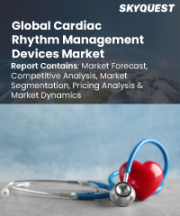
|
시장보고서
상품코드
1772267
미국의 심장 박동 관리 장치 : 시장 규모, 점유율, 동향 분석, 제품별, 부문 예측(2025-2033년)U.S. Cardiac Rhythm Management Devices Market Size, Share & Trends Analysis Report By Product (Pacemakers, Defibrillators, Cardiac Resynchronization Therapy (CRT)), And Segment Forecasts, 2025 - 2033 |
||||||
시장 규모와 동향 :
미국의 심장 박동 관리 장치 시장 규모는 2024년에 68억 달러로 평가되었고, 2025년부터 2033년에 걸쳐 CAGR 6.6%로 성장할 것으로 예측됩니다.
미국의 심장 박동 관리 장치 시장은 임상 수요 증가, 장비 기술 진화, 원격 치료 통합 확대가 융합하여 진전하고 있습니다.
2024년 5월, Defibtech은 미국에서 라이프라인 VIEW와 ECG 제세동기의 라인업을 확충해, 영어와 스페인어의 토글 기능을 갖춘 2언어 대응 AED 모델을 발매했습니다.
미국에서는 부정맥과 심부전의 부담이 증가하고 있으며, 심장 박동 관리 장치 수요가 가속되고 있습니다. 페이스메이커, 제세동기, 재동기화 시스템 등의 기기는 만성 심장 질환의 관리와 심장 돌연사의 예방에 필수적인 도구가 되고 있습니다. 2024년 9월, 캘리포니아 대학교 샌프란시스코(UCSF) 연구진이 미국심장학회지(Journal of the American College of Cardiology)에 발표한 연구에 따르면, 미국 성인 중 약 1,055만 명이 심방세동을 앓고 있는 것으로 추정됩니다. 2005년부터 2019년까지 캘리포니아주의 2,900만 건이 넘는 병원 기록을 기반으로 한 분석 결과, 현재의 유병률은 이전 추정치의 약 3배이며, 젊고 다양한 집단에 영향을 미치는 것으로 나타났습니다.
심부전은 심장이 혈액을 효과적으로 보낼 수 없는 만성적이고 진행성의 병태이며, 종종 입원, 생활의 질 저하, 높은 사망률을 초래합니다. 특히 인구의 고령화와 당뇨병이나 고혈압 등의 합병증 증가에 의해 의료 시스템에 점점 더 큰 부담을 주고 있습니다. 심장 박동 관리 및 리드 관리 시스템을 포함한 장치 개입은 심부전 환자의 조기 진단, 안정화 및 장기 치료에 점점 더 필수적입니다. 2025년 1월, 미국심부전학회(Heart Failure Society of America)에 따르면, 20세 이상 미국 성인의 약 670만 명이 심부전을 앓고 있습니다. 이러한 유병률은 2030년에는 870만 명, 2040년에는 1,030만 명, 그리고 2050년에는 1,140만 명에 이를 것으로 전망됩니다.
장비 공학의 발전은 특히 리드리스 기술과 무선 기술의 출현으로 시장을 재형성하고 있습니다. 이러한 향상된 기능은 더 큰 안전성, 사용 편의성, 장기적인 신뢰성을 제공하여 병원 및 외래 환경 모두에서 점점 더 매력적으로 변합니다. Heart Rhythm 2025에서 발표된 LEADR(Lead EvaluAtion for Defibrillation and Reliability) 임상 시험 결과에 따르면, 이식 시점에서 완전한 제세동 성공률이 보고되었습니다.
원격 모니터링이 심장 치료 워크플로우에 통합됨에 따라 건강 관리 제공업체 전반의 채택이 진행되고 있습니다. 이식된 기기에서 실시간 데이터를 전송하면 부정맥과 기기 성능 문제를 조기에 발견하여 계획되지 않은 개입을 줄이고 사전 예방적 치료 모델을 지원할 수 있습니다. 2025년 3월, MicroPort CRM은 CE 마크 승인을 받은 후 유럽에서 SmartView Connect 앱 모바일을 출시했습니다.
목차
제1장 조사 방법과 범위
제2장 주요 요약
제3장 미국의 심장 박동 관리 장치 시장의 변수, 동향, 범위
- 시장 계통 전망
- 상위 시장 전망
- 관련/부수 시장 전망
- 시장 역학
- 시장 성장 촉진요인 분석
- 시장 성장 억제요인 분석
- 미국 심장 박동 관리 장치 시장 분석 도구
- 업계 분석 - Porter's Five Forces 분석
- PESTEL 분석
제4장 미국의 심장 박동 관리 장치 시장 : 제품 추정 및 예측 분석
- 미국 심장 박동 관리 장치 시장 : 제품 대시보드
- 미국의 심장 박동 관리 장치 시장 : 제품 변동 분석
- 미국의 심장 박동 관리 장치 시장(제품별, 수익별)
- 페이스메이커
- 이식형
- 체외식
- 제세동기
- 이식형 제세동기(ICD)
- 체외식 제세동기
- 심장 재동기 치료(CRT)
- CRT 제세동기
- CRT 페이스메이커
제5장 경쟁 구도
- 주요 제조업체에 의한 최근의 동향과 영향 분석
- 기업/경쟁의 분류
- 벤더 상황
- 주요 리셀러 및 채널 파트너 목록
- Key customers
- Key company market share analysis, 2024
- 기업 프로파일
- Medtronic
- Boston Scientific Corporation
- Abbott
- Schiller AG
- Stryker
- Koninklijke Philips NV
- Biotronik
- Progetti Srl
- MicroPort Scientific Corporation
Market Size & Trends:
The U.S. cardiac rhythm management devices market size was estimated at USD 6.8 billion in 2024 and is projected to grow at a CAGR of 6.6% from 2025 to 2033. The U.S. cardiac rhythm management market is advancing through a convergence of growing clinical demand, evolving device technologies, and greater integration of remote care. Companies are aligning product strategies with these shifts, emphasizing miniaturization, connectivity, and continuous monitoring to support both acute and long-term patient management.
In May 2024, Defibtech expanded its Lifeline VIEW and ECG defibrillator lines in the U.S. by launching dual-language AED models with English and Spanish toggle features. These updates aim to improve accessibility and usability for diverse responders during sudden cardiac emergencies.
The increasing burden of arrhythmias and heart failure in the U.S. is accelerating the demand for cardiac rhythm management devices. An aging population combined with a rise in comorbidities such as hypertension, obesity, and diabetes is creating a steady need for reliable long-term cardiac interventions. Devices such as pacemakers, defibrillators, and resynchronization systems are becoming critical tools in managing chronic cardiac conditions and preventing sudden cardiac death. In September 2024, researchers from the University of California, San Francisco published a study in the Journal of the American College of Cardiology estimating that atrial fibrillation affects 10.55 million U.S. adults. The analysis, based on over 29 million hospital records in California from 2005-2019, revealed that current prevalence is nearly triple the earlier estimates and increasingly affects younger, more diverse populations.
Heart failure is a chronic, progressive condition marked by the heart's inability to pump blood effectively, often resulting in hospitalizations, reduced quality of life, and high mortality. It places a growing burden on healthcare systems, especially with aging populations and rising comorbidities such as diabetes and hypertension. Device-based interventions, including cardiac rhythm management and lead management systems, are increasingly essential for early diagnosis, stabilization, and long-term care in heart failure patients. In January 2025, according to the Heart Failure Society of America, around 6.7 million U.S. adults over 20 have heart failure, with prevalence projected to reach 8.7 million by 2030, 10.3 million by 2040, and 11.4 million by 2050.
Advances in device engineering are reshaping the market, particularly with the emergence of leadless and wireless technologies. Leadless pacemakers reduce complications associated with conventional systems and simplify implantation, while wireless platforms improve communication and synchronization. These enhancements offer greater safety, ease of use, and long-term reliability, making them increasingly attractive in both hospital and ambulatory settings. In April 2025, Medtronic gained FDA clearance for the OmniaSecure, a miniaturized defibrillation lead tailored for implantable cardioverter-defibrillator systems. Its compact 4.7 French size supports accurate placement while lowering the chance of vascular or valve complications. Findings from the LEADR trial, shared at Heart Rhythm 2025, reported full defibrillation success at implantation.
The integration of remote monitoring into cardiac care workflows is driving further adoption across healthcare providers. Real-time data transmission from implanted devices enables early detection of arrhythmias and device performance issues, reducing unplanned interventions and supporting proactive care models. This capability also aligns with broader digital health strategies and payer interest in minimizing costly hospital visits. In March 2025, MicroPort CRM launched the SmartView Connect App Mobile in Europe after receiving CE mark approval. The Android app links Bluetooth-enabled pacemakers to clinics, enabling secure remote monitoring without bedside monitors for bradycardia patients.
U.S. Cardiac Rhythm Management Devices Market Report Segmentation
This report forecasts revenue growth at the country level and provides an analysis of the latest industry trends in each of the sub-segments from 2021 - 2033. For this study, Grand View Research has segmented the U.S. cardiac rhythm management devices market report based on product:
- Product Outlook (Revenue, USD Million, 2021 - 2033)
- Pacemakers
- Implantable
- External
- Defibrillators
- Implantable Cardioverter Defibrillators (ICD)
- S-ICD
- T-ICD
- External Defibrillator
- Manual External Defibrillator
- Automatic External Defibrillator
- Wearable Cardioverter Defibrillator
- Cardiac Resynchronization Therapy (CRT)
- CRT-Defibrillator
- CRT-Pacemakers
Table of Contents
Chapter 1. Methodology and Scope
- 1.1. Market Segmentation & Scope
- 1.2. Segment Definitions
- 1.2.1. Product
- 1.2.2. Estimates and forecasts timeline
- 1.3. Research Methodology
- 1.4. Information Procurement
- 1.4.1. Purchased database
- 1.4.2. GVR's internal database
- 1.4.3. Secondary sources
- 1.4.4. Primary research
- 1.5. Information or Data Analysis
- 1.5.1. Data analysis models
- 1.6. Market Formulation & Validation
- 1.7. Model Details
- 1.7.1. Volume price analysis (Model 1)
- 1.8. List of Secondary Sources
- 1.9. List of Primary Sources
- 1.10. Objectives
Chapter 2. Executive Summary
- 2.1. Market Outlook
- 2.2. Segment Outlook
- 2.2.1. Product outlook
- 2.3. Competitive Insights
Chapter 3. U.S. Cardiac Rhythm Management Devices Market Variables, Trends & Scope
- 3.1. Market Lineage Outlook
- 3.1.1. Parent market outlook
- 3.1.2. Related/ancillary market outlook
- 3.2. Market Dynamics
- 3.2.1. Market driver analysis
- 3.2.1.1. Rising prevalence of arrhythmias and heart failure
- 3.2.1.2. Advancements in leadless and wireless cardiac devices
- 3.2.1.3. Integration of remote monitoring with cardiac care platforms
- 3.2.2. Market restraint analysis
- 3.2.2.1. Risk of device-related complications and recalls
- 3.2.2.2. Stringent regulatory approvals and reimbursement challenges
- 3.2.1. Market driver analysis
- 3.3. U.S. Cardiac Rhythm Management Devices Market Analysis Tools
- 3.3.1. Industry Analysis - Porter's
- 3.3.1.1. Supplier power
- 3.3.1.2. Buyer power
- 3.3.1.3. Substitution threat
- 3.3.1.4. Threat of new entrants
- 3.3.1.5. Competitive rivalry
- 3.3.2. PESTEL Analysis
- 3.3.2.1. Political landscape
- 3.3.2.2. Technological landscape
- 3.3.2.3. Economic landscape
- 3.3.1. Industry Analysis - Porter's
Chapter 4. U.S. Cardiac Rhythm Management Devices Market: Product Estimates & Trend Analysis
- 4.1. U.S. Cardiac Rhythm Management Devices Market: Product Dashboard
- 4.2. U.S. Cardiac Rhythm Management Devices Market: Product Movement Analysis
- 4.3. U.S. Cardiac Rhythm Management Devices Market by Product, Revenue
- 4.4. Pacemakers
- 4.4.1. Market estimates and forecast 2021 - 2033 (USD Million)
- 4.4.2. Implantable
- 4.4.2.1. Market estimates and forecast 2021 - 2033 (USD Million)
- 4.4.3. External
- 4.4.3.1. Market estimates and forecast 2021 - 2033 (USD Million)
- 4.5. Defibrillators
- 4.5.1. Market estimates and forecast 2021 - 2033 (USD Million)
- 4.5.2. Implantable Cardioverter Defibrillators (ICD)
- 4.5.2.1. Market estimates and forecast 2021 - 2033 (USD Million)
- 4.5.2.2. S-ICD
- 4.5.2.2.1. Market estimates and forecast 2021 - 2033 (USD Million)
- 4.5.2.3. T-ICD
- 4.5.2.3.1. Market estimates and forecast 2021 - 2033 (USD Million)
- 4.5.3. External Defibrillator
- 4.5.3.1. Market estimates and forecast 2021 - 2033 (USD Million)
- 4.5.3.2. Manual External Defibrillator
- 4.5.3.2.1. Market estimates and forecast 2021 - 2033 (USD Million)
- 4.5.3.3. Automatic External Defibrillator
- 4.5.3.3.1. Market estimates and forecast 2021 - 2033 (USD Million)
- 4.5.3.4. Wearable Cardioverter Defibrillator
- 4.5.3.4.1. Market estimates and forecast 2021 - 2033 (USD Million)
- 4.6. Cardiac Resynchronization Therapy (CRT)
- 4.6.1. Market estimates and forecast 2021 - 2033 (USD Million)
- 4.6.2. CRT-Defibrillator
- 4.6.2.1. Market estimates and forecast 2021 - 2033 (USD Million)
- 4.6.3. CRT-Pacemaker
- 4.6.3.1. Market estimates and forecast 2021 - 2033 (USD Million)
Chapter 5. Competitive Landscape
- 5.1. Recent Developments & Impact Analysis, By Key Manufacturers
- 5.2. Company/Competition Categorization
- 5.3. Vendor Landscape
- 5.3.1. List of key distributors and channel partners
- 5.3.2. Key customers
- 5.3.3. Key company market share analysis, 2024
- 5.4. Company Profiles
- 5.4.1. Medtronic
- 5.4.1.1. Company overview
- 5.4.1.2. Financial performance
- 5.4.1.3. Product benchmarking
- 5.4.1.4. Strategic initiatives
- 5.4.2. Boston Scientific Corporation
- 5.4.2.1. Company overview
- 5.4.2.2. Financial performance
- 5.4.2.3. Product benchmarking
- 5.4.2.4. Strategic initiatives
- 5.4.3. Abbott
- 5.4.3.1. Company overview
- 5.4.3.2. Financial performance
- 5.4.3.3. Product benchmarking
- 5.4.3.4. Strategic initiatives
- 5.4.4. Schiller AG
- 5.4.4.1. Company overview
- 5.4.4.2. Financial performance
- 5.4.4.3. Product benchmarking
- 5.4.4.4. Strategic initiatives
- 5.4.5. Stryker
- 5.4.5.1. Company overview
- 5.4.5.2. Financial performance
- 5.4.5.3. Product benchmarking
- 5.4.5.4. Strategic initiatives
- 5.4.6. Koninklijke Philips N.V.
- 5.4.6.1. Company overview
- 5.4.6.2. Financial performance
- 5.4.6.3. Product benchmarking
- 5.4.6.4. Strategic initiatives
- 5.4.7. Biotronik
- 5.4.7.1. Company overview
- 5.4.7.2. Financial performance
- 5.4.7.3. Product benchmarking
- 5.4.7.4. Strategic initiatives
- 5.4.8. Progetti Srl
- 5.4.8.1. Company overview
- 5.4.8.2. Financial performance
- 5.4.8.3. Product benchmarking
- 5.4.8.4. Strategic initiatives
- 5.4.9. MicroPort Scientific Corporation
- 5.4.9.1. Company overview
- 5.4.9.2. Financial performance
- 5.4.9.3. Product benchmarking
- 5.4.9.4. Strategic initiatives
- 5.4.1. Medtronic
(주말 및 공휴일 제외)


















